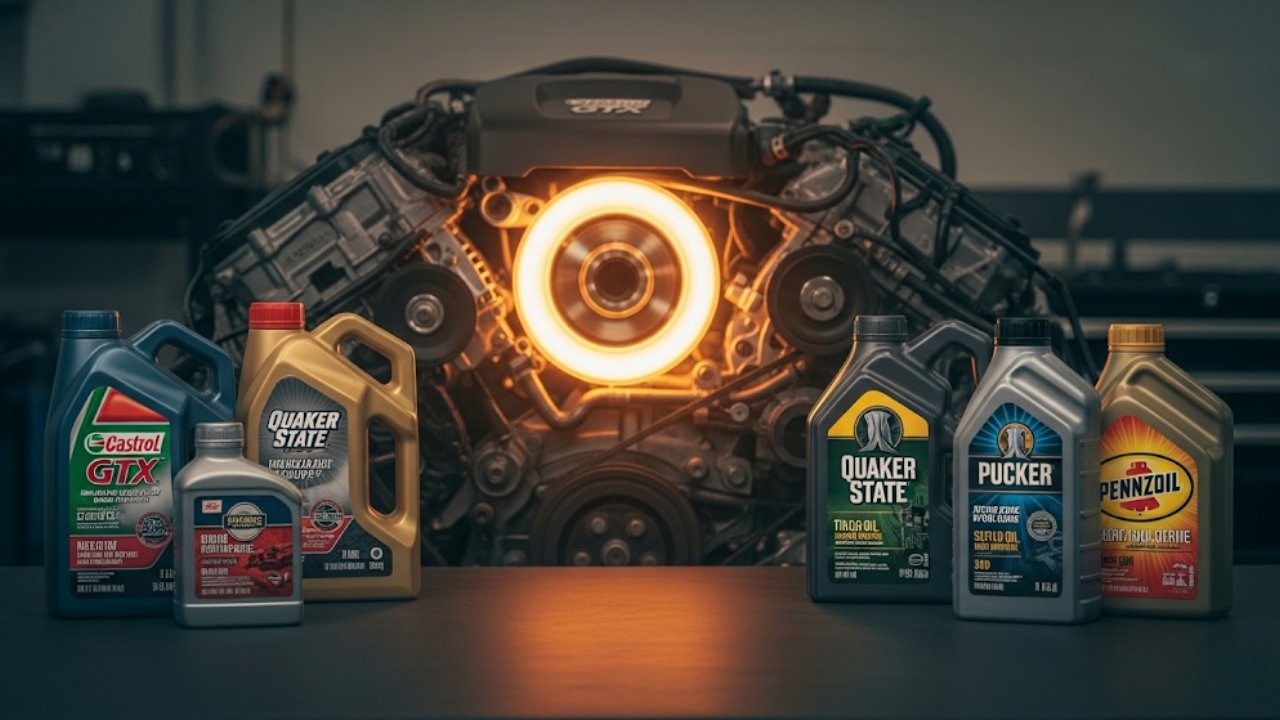Car Oil Brands List: Trusted Names That Keep Your Engine Running Smoothly

When I bought my first car, I had no idea what engine oil even did. I just knew I had to change it now and then. A friend once told me, “Your car’s oil is like blood in the body—ignore it, and your car suffers.” That stuck with me.
Fast forward to today, and I’ve spent years learning what goes into choosing the right oil brand. Believe me, not all brands are made equal. Some give better protection, others work well in cold weather, and a few just smell oddly nice when you’re pouring them in!
In this guide, I’ll walk you through a trusted car oil brands list that has earned the respect of drivers and mechanics around the world. Whether you drive a turbocharged beast or a family sedan, there’s a name on this list that will match your engine’s needs.
What Makes a Great Car Oil Brand?

-
Quality of additives – These are the chemicals that protect your engine from rust, heat, and sludge.
-
Viscosity performance – Good oil keeps its flow, whether it’s winter morning or summer noon.
-
Engine compatibility – Some brands focus on diesel engines; others are better for high-mileage vehicles.
-
Certifications – Look for approvals like API SN, ILSAC GF-6, and ACEA A3/B4.
-
Reputation & testing – Top brands test their oils under real-world driving conditions.
Personally, I’ve always valued brands that invest in testing. You don’t want oil that breaks down halfway through a road trip!
The Trusted Car Oil Brands List (Top Picks for All Drivers)
Here’s a breakdown of the most reliable car oil brands in the market today. I’ve used some of them myself, and I’ve spoken to other drivers and mechanics for deeper insights.
1. Mobil 1 – The Performance Champion
When people say “premium motor oil,” they often mean Mobil 1. It’s like the Coca-Cola of car oils—always recognizable and widely trusted.
-
Best For: High-performance engines, sports cars, turbocharged models
-
Standout Feature: Excellent high-temp stability and wear protection
-
API Rating: SN Plus / SP / ILSAC GF-6
-
Popular Variant: Mobil 1 Extended Performance 5W-30
Mobil 1 is often the factory fill for brands like Porsche, Mercedes-Benz, and Chevrolet Corvette. That says a lot. I’ve used it during long drives in the heat of summer, and my engine stayed calm and cool.
| Feature | Mobil 1 Extended Performance |
|---|---|
| Viscosity Grade | 5W-30 |
| Full Synthetic | Yes |
| Oil Change Interval | Up to 20,000 miles |
| Price Range | $$ |
2. Castrol – The Everyday Hero
Castrol is another big name that’s earned drivers’ trust for decades. If Mobil 1 is the performance champ, Castrol is the dependable all-rounder.
-
Best For: Daily commuters, older cars, newer engines—pretty much all types
-
Standout Feature: “Fluid Titanium” technology for strength under pressure
-
Popular Variant: Castrol EDGE Advanced Full Synthetic 0W-40
Back when I drove my first Toyota Corolla, I switched to Castrol after a friend’s recommendation. It made the engine quieter, and the gear shifts felt smoother somehow.
Castrol oil is also easy to find. Whether you’re at a local auto shop or a chain store, you’ll see their bright green bottles on the shelf.
3. Valvoline – Trusted Since 1866
There’s something reassuring about a company that’s been around for over 150 years. Valvoline has deep roots in American auto history, and their oils reflect that experience.
-
Best For: High-mileage vehicles, budget-conscious drivers
-
Standout Feature: MaxLife formula for engines over 75,000 miles
-
Popular Variant: Valvoline Advanced Full Synthetic SAE 5W-30
Valvoline feels like the oil your dad used—and for good reason. It’s been around long enough to prove itself. The high-mileage formula helped reduce oil burn in my cousin’s old SUV, which had over 150,000 miles on it!
If you’re driving a car that’s seen better days but still runs, Valvoline gives it a second wind.
4. Pennzoil – Made from Natural Gas
This one’s a little different. Pennzoil makes its synthetic oil using natural gas, not crude oil. That makes it cleaner, and they market it as “PurePlus Technology.”
-
Best For: Eco-conscious drivers, turbocharged engines
-
Standout Feature: Natural gas-based synthetic formula
-
Popular Variant: Pennzoil Ultra Platinum 5W-30
I used Pennzoil during a road trip across the Chittagong Hill Tracts once, and the fuel economy was surprisingly good. The engine also felt zippy in the hills.
Fun fact? Ferrari recommends Pennzoil. That tells you they’re serious about quality.
5. Royal Purple – High Performance & Racing
If you love speed, you’ll love Royal Purple. This brand isn’t for everyone. But if you’re into track days, tuned engines, or just want the best for your sports car—give this a try.
-
Best For: Racing, performance mods, muscle cars
-
Standout Feature: Proprietary Synerlec additive tech
-
Popular Variant: Royal Purple High Performance Street 5W-30
Royal Purple has a loyal fanbase. My friend drives a Mustang GT, and he swears it made a difference in how the engine sounded and responded. It’s a bit pricey, but you get what you pay for.
| Feature | Royal Purple HP Street 5W-30 |
|---|---|
| Performance Tier | Premium |
| Engine Type | Gasoline engines |
| Additive Technology | Synerlec |
| Price Range | $$$ |
Why Your Engine Oil Brand Choice Matters
Think of your engine like a chef. It needs the right ingredients to create a perfect dish—or in this case, smooth rides and long life. Choosing the right car oil brand affects:
-
Fuel efficiency
-
Engine wear and tear
-
Oil change intervals
-
Cold and hot weather performance
Using a low-quality oil is like feeding your body junk food every day. Eventually, the damage shows. A quality brand keeps everything running clean and efficient.
I learned this the hard way. I once tried a cheap oil brand (which I won’t name), and my car started knocking just two weeks later. Switched back to a trusted brand, and the problem vanished.
Honorable Mentions: More Names Worth Considering
While the top 5 are widely known, here are a few more car oil brands that deserve a shout-out:
-
Liqui Moly – German brand known for premium additives
-
Shell Helix – High-quality oils used in global motorsports
-
Total Quartz – French brand with clean burn formulas
-
Amsoil – High-performance synthetic oils for enthusiasts
-
Super Tech (Walmart) – Budget-friendly option that meets API standards
Each of these has a unique advantage. For example, Liqui Moly worked wonders in a friend’s BMW. The engine felt buttery smooth, and he even noticed better throttle response.
Comparing Car Oil Brands Side by Side
Sometimes it helps to see things clearly. Here’s a simple table comparing the top car oil brands based on key features:
| Brand | Best For | Type | Mileage Range | Key Feature |
|---|---|---|---|---|
| Mobil 1 | Performance & longevity | Full Synthetic | Up to 20,000 miles | Factory-fill for premium vehicles |
| Castrol | Everyday driving | Full Synthetic | Up to 15,000 miles | Fluid Titanium tech |
| Valvoline | High-mileage engines | Synthetic Blend | 5,000–7,500 miles | MaxLife wear protection |
| Pennzoil | Fuel efficiency, eco use | Full Synthetic | Up to 10,000 miles | Made from natural gas (PurePlus) |
| Royal Purple | Performance/racing | Full Synthetic | Up to 12,000 miles | Proprietary Synerlec additives |
This table isn’t just data—it’s years of real-world results packed into a glance. Whether you’re someone who does weekend road trips or just wants to avoid engine trouble on daily commutes, your engine oil choice matters.
How to Choose the Best Oil Brand for Your Car
Let’s simplify the decision-making. Choosing from the car oil brands list can feel overwhelming, but it doesn’t have to be. Here’s a simple checklist:
-
Check your owner’s manual – Always start here. It tells you what viscosity and specs your engine needs.
-
Consider your driving style – Long trips? Stop-and-go traffic? Choose accordingly.
-
Match the oil to your climate – Cold regions need oils that stay fluid in low temps (like 0W-30).
-
Mileage matters – High-mileage formulas help reduce leaks and oil burn in older engines.
-
Stick with synthetic if recommended – Many modern cars need full synthetic oil for turbochargers or small engines.
One trick I use? Ask your local mechanic which oils they’ve seen perform well over time, not just what’s trending. Real feedback beats marketing every time.
Cultural Tip: What’s Popular in Bangladesh and South Asia?
If you’re reading this from Bangladesh, India, or nearby countries, you’ve probably seen brands like Shell Helix, Total Quartz, and Castrol in every local garage. These brands are respected, widely available, and used in both sedans and motorcycles.
In rural areas, many still prefer Castrol GTX or Servo Oil by Indian Oil. They’re cost-effective and available even in remote towns. But if you’re driving a reconditioned Japanese or European car, switching to Mobil 1 or Liqui Moly could extend the life of your engine.
Many taxi drivers I’ve spoken with swear by Valvoline or Pennzoil, especially for their long working hours and mileage-heavy schedules.
Red Flags: Signs of a Low-Quality Oil Brand
Not every oil brand is worth your money—or your engine’s health. Here are some signs you’re dealing with a poor-quality product:
-
No clear API/ILSAC certifications on the label
-
Generic branding and vague descriptions
-
Odd smell or unusual consistency
-
Reviews mentioning sludge buildup or engine noise
-
Very low pricing (if it’s too cheap, it’s too risky)
Also, beware of counterfeit oil. Yes, it’s a thing! Especially in street-side auto shops or third-party sellers online. Stick to authorized dealers and well-known retailers like Amazon, Walmart, or certified local suppliers.
Benefits of Using a Reputable Car Oil Brand
Choosing from the best car oil brands doesn’t just give peace of mind—it actually saves money long-term. Here’s why:
-
Better fuel economy – A clean engine uses less fuel
-
Longer engine life – Less wear and tear over time
-
Fewer breakdowns – Good oils reduce overheating and friction
-
Extended oil change intervals – You don’t need to change synthetic oil as often
-
Resale value – Cars with clean maintenance history fetch higher prices
One friend of mine drives a 2005 Honda Civic with over 200,000 miles. He’s stuck with Castrol GTX High Mileage for the past decade. Not only is the engine still solid, but it passed emissions with flying colors. That’s the power of brand trust.
Top Tips to Get the Most Out of Your Motor Oil
Using the right car oil brand is half the story. Here are a few tips to keep your engine running like new:
-
Warm up your engine before driving, especially in winter. Cold oil doesn’t flow well right away.
-
Change your oil filter with every oil change. Don’t cheap out on this!
-
Use the right oil for your climate—0W or 5W for colder regions.
-
Watch for oil leaks—a common issue in older cars.
-
Don’t overfill—too much oil can damage seals and gaskets.
Also, stick to your car’s oil change schedule. If your dashboard light comes on or your oil looks dirty, don’t ignore it. It’s your car crying for help.
Fun Fact: Car Oil Isn’t Just for Engines
Did you know some car oil brands make more than just engine oil? Brands like Liqui Moly, Amsoil, and Castrol also make:
-
Transmission fluids
-
Coolants
-
Brake fluids
-
Additives for cleaning and engine performance
Using the same brand across different fluids often gives better compatibility and performance. It’s like using the same skincare line—things just work better together.
FAQs: All Your Questions About Car Oil Brands Answered
Q1: Can I switch between car oil brands?
Yes, as long as the viscosity and specs match your engine’s needs. Stick to synthetic if that’s what your engine requires.
Q2: Are expensive oils always better?
Not always. Some budget brands perform surprisingly well. But premium brands offer more advanced protection.
Q3: What oil brand is best for high mileage cars?
Valvoline MaxLife and Castrol GTX High Mileage are great for engines over 75,000 miles.
Q4: Is synthetic oil better than conventional?
Yes, in most cases. It lasts longer, handles extreme temperatures better, and keeps engines cleaner.
Q5: How often should I change my oil?
Check your owner’s manual. Typically, it’s every 5,000 to 10,000 miles for synthetic oils.
Q6: Can I mix two different oil brands?
It’s not ideal, but in emergencies, it won’t destroy your engine. Just don’t mix synthetic with conventional if your car needs full synthetic.
Q7: What oil brand does Toyota recommend?
Toyota often recommends Mobil 1 or Castrol for its newer models, depending on the region.
Q8: Are store brands like Kirkland or Super Tech any good?
Yes! Many store brands meet industry specs and are tested just like premium brands, though they may lack advanced additives.
Final Thoughts: Trust Your Engine to the Right Name
At the end of the day, your car isn’t just a machine. It’s your partner in road trips, daily commutes, and spontaneous getaways. The oil you choose flows through its heart, and the car oil brand matters more than we often realize.
Choose smart. Drive safe. Trust brands that have earned it.
Here’s a quick recap of the top 10 car oil brands worth your attention:
-
Mobil 1
-
Castrol
-
Valvoline
-
Pennzoil
-
Royal Purple
-
Shell Helix
-
Liqui Moly
-
Amsoil
-
Total Quartz
-
Super Tech
Each has its strengths, so don’t just follow trends—pick what fits your car and lifestyle best.






